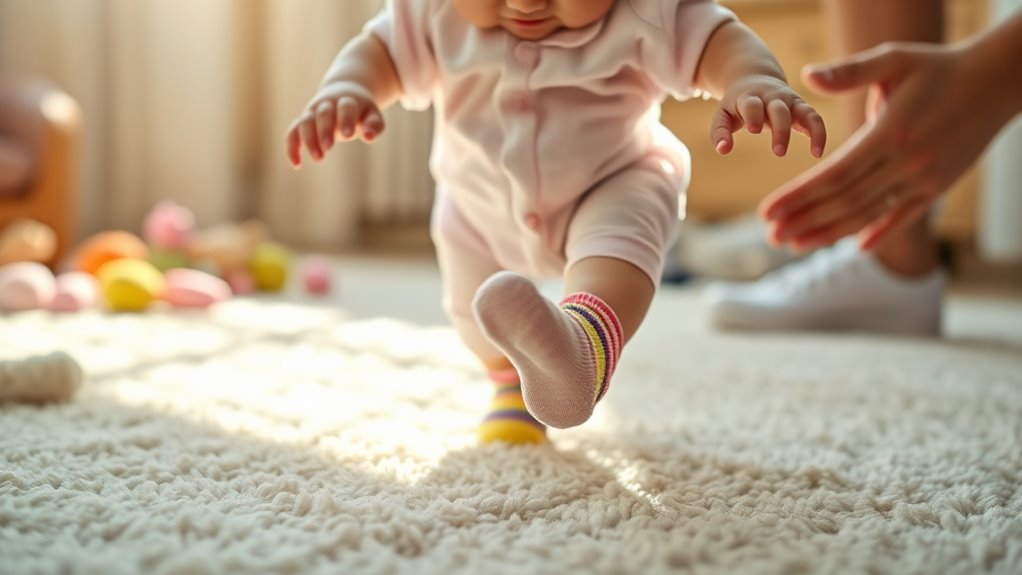As your baby approaches their first steps, it’s important to understand their walking development. Most babies take their first independent steps between 12 and 15 months, but some may start earlier or later. Look for signs of readiness like standing without support and gaining strength. Encourage their progress by providing a safe space and supportive tools like push toys. Your baby’s journey is unique, so keep an eye on their milestones and watch for what’s next.
Key Takeaways
- Most babies take their first steps between 9 and 18 months, with independent walking typically occurring around 12 to 15 months.
- Developmental stages like sitting, crawling, and pulling up to stand are important milestones leading to walking.
- Signs of readiness include standing without support and increased fussiness, indicating a focus on new skills.
- Create a safe environment for exploration, using sturdy push toys and encouraging barefoot play for better balance.
- Consult a pediatrician if walking hasn’t started by 18 months, as individual timelines vary.

Watching your baby take their first steps is an exciting milestone that typically happens between 9 and 18 months. Most babies walk independently around 12 to 15 months, but every child develops at their own pace. While some might surprise you by walking a bit earlier or later, it’s essential to remember that variability is part of this journey. Your baby will show signs leading up to those first steps, and being aware of these can help you support their development.
Around 7 to 10 months, you might notice your baby pulling up to stand. This action is a crucial step toward walking and indicates that they’re gaining strength and balance. As they reach 9 to 13 months, you’ll likely see them cruising along furniture, using it for support as they explore their environment. By 10 to 16 months, they may begin standing without support, which is another exciting indicator that walking is just around the corner.
Keep an eye out for increased fussiness or disrupted sleep patterns during this time; these can be signs that your little one is focused on mastering new skills.
Before your baby takes those first steps, they often go through several developmental stages. Sitting up independently usually happens around 6 to 7 months, followed by crawling, which can start between 6 to 9 months. While some babies skip crawling altogether, it’s a common part of their journey. The transition into pulling up to stand marks a significant step toward walking, and from there, cruising will help them gain confidence and balance.
To encourage your baby as they learn to walk, provide them with support and a safe environment. You can hold their hands or use sturdy push toys to help them gain balance. Creating a safe space free from hazards is essential for exploration. Encourage barefoot play, as it enhances sensory feedback, helping them understand their movements.
Avoid using wheeled walkers, as stationary alternatives can be more beneficial.
If your baby hasn’t taken their first steps by 18 months, it might be a good idea to consult a pediatrician. Late walking can be due to various factors, including genetic influences or developmental delays. Whatever the case, each child’s journey is unique, and with your encouragement and support, your little one will soon be on their way to confidently exploring their world.
Frequently Asked Questions
What Age Do Most Babies Take Their First Steps?
Most babies take their first steps between 9 and 18 months, with the average age being around 12 to 15 months.
You might notice your little one showing signs of readiness, like pulling up to stand or cruising along furniture.
It’s important to remember that each child develops at their own pace, so don’t worry if your baby starts walking earlier or later than others—you’re all on a unique journey!
How Can I Encourage My Baby to Walk?
To encourage your baby to walk, create a safe and stimulating environment.
You can position toys just out of reach, prompting them to move. Use sturdy furniture for cruising and consider push toys for support.
Keep your baby barefoot to help develop balance. Celebrate their small achievements with praise, and remember, patience is key—each baby walks at their own pace.
Your encouragement will boost their confidence as they explore their newfound mobility!
What Shoes Are Best for Early Walkers?
When selecting shoes for early walkers, focus on fit and comfort. You want shoes that allow enough room for your child’s toes to move freely.
Look for flexible soles to support natural movement and lightweight designs to minimize fatigue. Brands like Stride Rite and SeeKaiRun offer great options with safety features like rubber soles for traction.
Regularly check the fit as your child’s feet grow, ensuring they continue to support healthy development.
Should I Be Concerned if My Baby Isn’t Walking Yet?
If your baby’s not walking yet, it’s understandable to feel concerned.
Most babies take their first steps between 11 and 16 months, but every child develops at their own pace.
Keep an eye on milestones like sitting or standing supportively.
If your baby isn’t walking by 18 months, it’s wise to consult a pediatrician. They can assess for any potential issues and guide you on encouraging your little one to take those important steps.
How Can I Baby-Proof My Home for Walking Safety?
To create a safe space for your little one, start with smart safety measures. Secure heavy furniture, install sturdy safety gates, and remove risky items from reach.
Lock dangerous cabinets and cover outlets to prevent potential problems. In the bathroom, use non-slip mats and toilet locks.
Regularly review your home for new hazards as your child explores. Keeping your environment protective ensures peace of mind as they take their first steps.
Conclusion
As your little one takes those first wobbly steps, it’s like watching a tiny bird leave the nest, wings fluttering with newfound freedom. Each stride they take is a dance of determination and curiosity, a leap into the vast world that awaits. Embrace this beautiful journey, filled with tumbles and triumphs, for every stumble is a stepping stone toward confidence. Celebrate these moments, as they’re the building blocks of independence, guiding your baby toward a lifetime of exploration.









